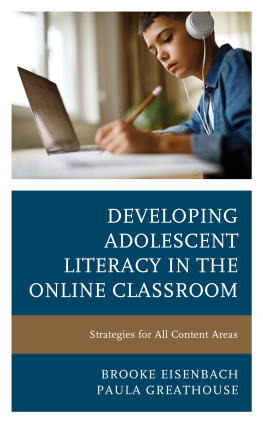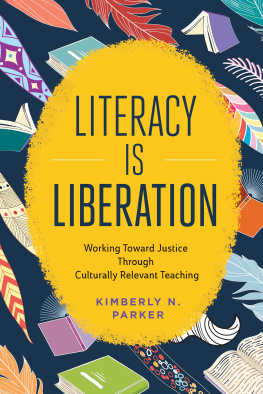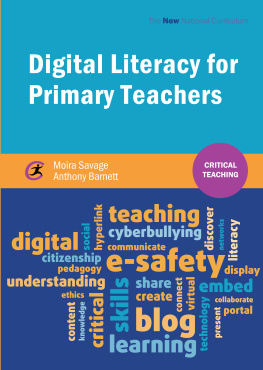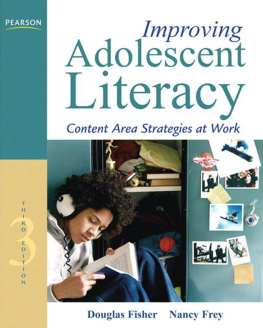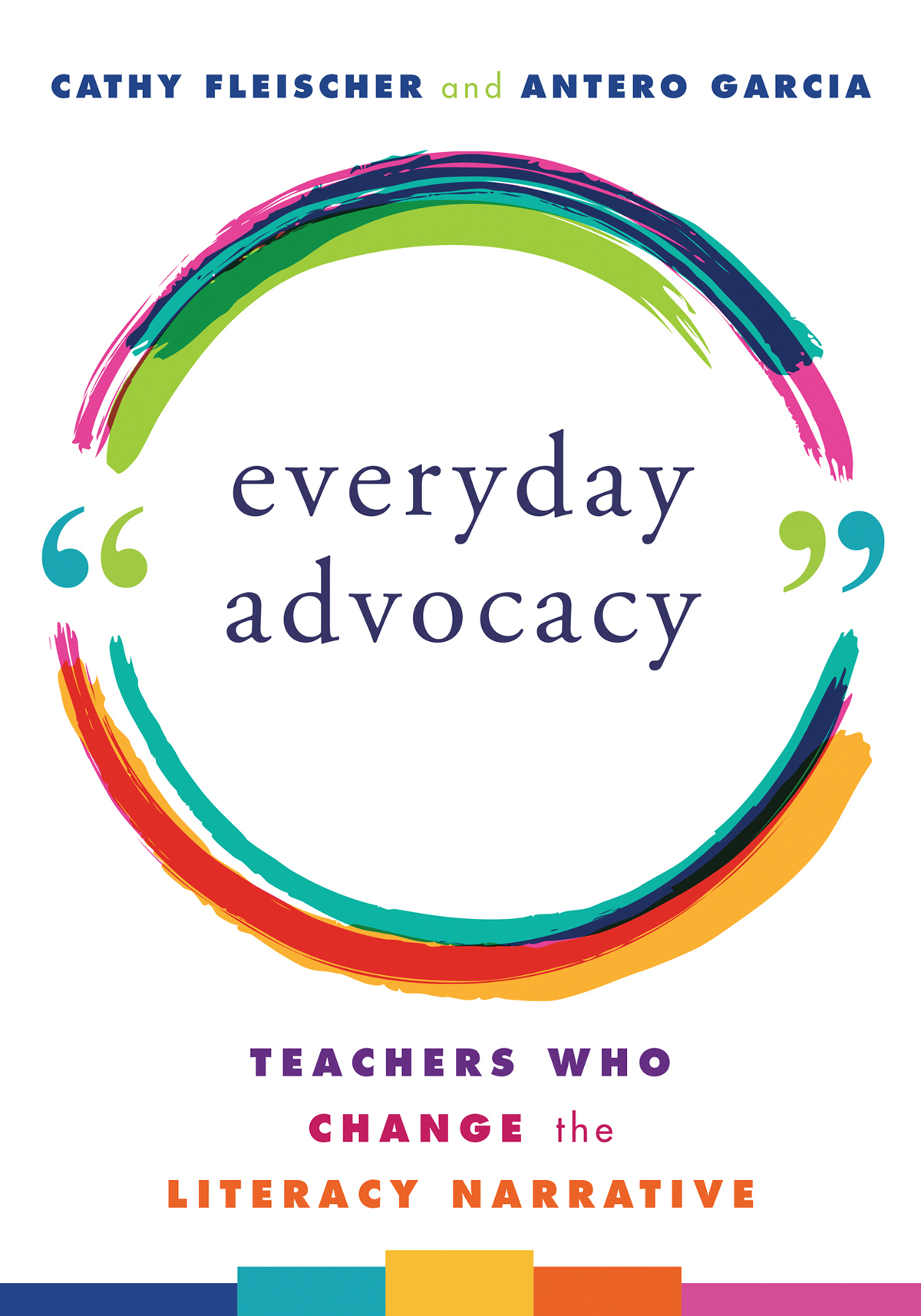Contents
Guide
Page List
This e-book contains some places that ask the reader to fill in questions or comments. Please keep pen and paper handy as you read this e-book so that you can complete the exercises within.

CATHY FLEISCHER
and ANTERO GARCIA
Foreword by Elyse Eidman-Aadahl

A NORTON PROFESSIONAL BOOK
Dedicated to the memory of Kent Williamson,
whose legendary devotion to teachers and
advocacy is at the center of it all
Contents
I distinctly remember my first visit to Congress as part of the National Writing Projects annual Teachers Day on The Hill. A teacher and teacher educator at the time, I hadnt really imagined myself trodding the halls of Congress, riding the little subway train in the basement of the Capitol Building to get from the House of Representatives to the Senate and back, passing the little underground signs for the Senate dry cleaners or the Congressional barbershop.
But there I was, wearing a brand new suit and carrying a briefcase filled with leave-behinds and student work.
My first visit was in the surprisingly small office of my local representative. As my writing project colleagues and I sat nervously in the waiting room, we could hear the receptionist over the intercom room say with excitement, The teachers are here! Another voice, one that we later learned came from the legislative aide, replied with equal eagerness, Great. Show them to the meeting room.
That first visit so many years ago was a revelation: these congressional staff were as eager to see us as we were to meet with them. And in the meeting that followed, they asked question after question about what was actually happening in our classrooms, about what could make a positive difference for young people, about what we saw as the unintended consequences of policies in place. Mostly, they wanted to hear stories of how policy affected the real work of teaching and learning told from people they considered a trusted source: actual teachers.
I learned many lessons that day that have informed my current work in the National Writing Project, lessons that are beautifully conveyed in Everyday Advocacy. I learned that something as seemingly distant as a trip to Washington, DC to visit Congress was, at base, a simple human process of planning and organizing that was well within reach of any teacher. I learned that policy-makers were people who might be as ready to listen as I was to speak. And I learned to be prepared with solid information and a focused message, yes, but more importantly, I needed to come prepared with a powerful story.
The Story Is the Story
When I was a teacher, I was rarely encouraged to think of my work as advocacy, a word that sounded to some as too political for what teachers might do on a daily basis. Sitting in that congressional office, of course, I couldnt avoid taking up the word: I was unquestionably engaged in advocacy. But even there I was being educated; introduced to a different vision of advocacy, one closer to the message of this book, through my conversations with policy makers and the stories they told.
In one office a senior aide shared how enrolling her son in summer writing camp helped her understand what we meant about reducing emphasis on testing writing to make space and time for real writing. She explained how the teachers leading the camp had made it a point to explain its philosophy and to invite parents to visit and observe. I got it in a different way, she said. They, and my son, helped me see that creative work and academic work arent necessarily in competition. In another office, a young staffer talked about how her favorite writing teacher often shared with the class the dilemmas of teaching. We helped her connect those stories to the larger story of American education. And in one case, a senator meeting with us talked about how an elementary teacher he knew helped him understand the importance of professional development through a story about the faculty at his old elementary school. He remarked: She was the most credible expert Ive ever heard about education.
My colleagues and I saw that although we were the ones sitting in the offices, that official advocacy visit was preceded by a long line of stories, explanations, and small public teaching moments that paved our way. I doubt that any of the teachers who had done that important initial work saw themselves as doing anything other than what teachers do, but their everyday advocacy proved to be an essential part of creating the conversation that can lead to change.
When Teachers Tell the Stories
Cathy Fleischer and Antero Garcia, referring to stories such as those I heard from the policy-makers, note: Stories like these contribute to a public narrative that gradually takes on a kind of truth in the world, a truth that is mostly narrated by outsiders to the world of classrooms and teachers and students.
What would it take to change that? How do we invite more teachers to contribute to the public narrative about education, about youth and their potential, about their families and communities? What would it take for us to be the authors of our own profession?
As longtime members of the NWP, Fleischer and Garcia know the power and importance of learning to tell our own stories, both for how those stories shape the larger narrative and for how those stories shape our inner lives as educators. This book, and its important collection of stories by educators engaged in everyday advocacy and teacher educators exploring everyday advocacy with both their preservice and practicing teachers, aims to be part of the change. Everyday Advocacy clarifies how advocacy knowledge can be, at its core, a form of pedagogical knowledge at work in the wider world. Through the stories of educators not so different from us, we learn how our work in the world can be smart, safe, savvy, and sustainable.
The educators collected here are doing their part to build a strong and positive narrative for education. Our part is for us as educators to use our outside voices and claim a place in the public sphere.
Even now, as public satisfaction with experts, institutions, and each other plummets to an all-time low (July 2019), the public still generally trusts teachers and principals, still gives positive marks to their local schools, and increasingly shares teachers concerns over the adequacy of funding (PDK, 2019). Majorities say they would even support teachers in decisions to strike for better pay and working conditions. While polls such as the PDK Poll of the Publics Attitudes Toward the Public Schools portray teacher morale at a low point and frustration at a high point, it is important to know that we, as teachers, teacher educators, and local administrators, are still perhaps our communities most trusted and direct source of information and perspectives on education.
That trust is a precious and powerful commodityand a good place to begin our journey with Everyday Advocacy.
Elyse Eidman-Aadahl
Executive Director, National Writing Project
References
PDK (September 2019). Frustration in the Schools: Teachers Speak Out on Pay, Funding, and Feeling Valued.



